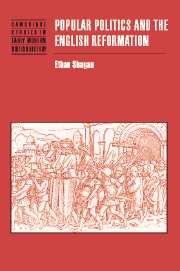Book contents
- Frontmatter
- Contents
- Acknowledgements
- List of abbreviations
- Note on the text
- Introduction
- Part I The break with Rome and the crisis of conservatism
- Part II Points of contact: the Henrician Reformation and the English people
- 4 Anticlericalism, popular politics and the Henrician Reformation
- 5 Selling the sacred: Reformation and dissolution at the Abbey of Hailes
- 6 ‘Open disputation was in alehouses’: religious debate in the diocese of Canterbury, c. 1543
- Part III Sites of Reformation: collaboration and popular politics under Edward VI
- Conclusion
- Bibliography
- Index
- Cambridge Studies in Early Modern British History
6 - ‘Open disputation was in alehouses’: religious debate in the diocese of Canterbury, c. 1543
Published online by Cambridge University Press: 05 July 2009
- Frontmatter
- Contents
- Acknowledgements
- List of abbreviations
- Note on the text
- Introduction
- Part I The break with Rome and the crisis of conservatism
- Part II Points of contact: the Henrician Reformation and the English people
- 4 Anticlericalism, popular politics and the Henrician Reformation
- 5 Selling the sacred: Reformation and dissolution at the Abbey of Hailes
- 6 ‘Open disputation was in alehouses’: religious debate in the diocese of Canterbury, c. 1543
- Part III Sites of Reformation: collaboration and popular politics under Edward VI
- Conclusion
- Bibliography
- Index
- Cambridge Studies in Early Modern British History
Summary
As important as it is to recognise how much of the Reformation English people experienced through the mediation of political debates and property disputes, it would be absurd to deny that they were also exposed to great swathes of systematic theology. Thus, when people adapted aspects of the evangelical programme to suit their needs, they were not unaware that they were sailing into potentially dangerous waters. In this chapter, then, I want to shift my analytical focus and consider the sorts of theological positions that were canvassed among ordinary English subjects. Yet, because the goal remains to trace a political process rather than one of national conversion, the argument of this chapter will necessarily appear somewhat perverse. While I discuss technical questions of theology, I make no claims about the relative popularity of different theological positions or the growth of Protestantism, the standard fare of most Reformation history. Rather, I want to demonstrate the crucial importance of a new phenomenon – rampant and public theological division – for the ways people received and responded to the state-sponsored Reformation. In other words, instead of privileging the experiences of actively partisan minorities, this chapter examines those minorities in order to show how their debates – conducted publicly and appealing for support at all social levels – affected English political culture more generally.
To bring order to such a potentially wide-ranging subject, this analysis focuses on the evidence created by a unique and fascinating event: the Prebendaries' Plot of 1543.
- Type
- Chapter
- Information
- Popular Politics and the English Reformation , pp. 197 - 232Publisher: Cambridge University PressPrint publication year: 2002



